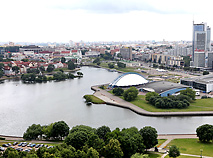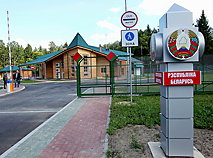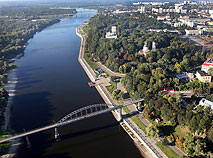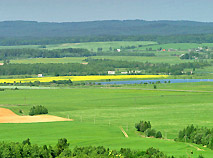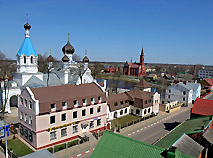Key facts about Belarus
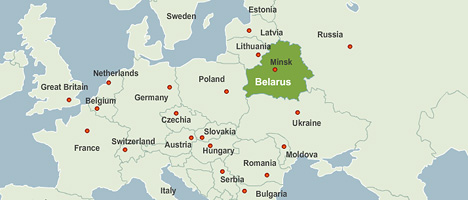
Belarus on the map of Europe
An introduction in facts and figures to this landlocked country in the north-east of Europe
Official Name
Republic of Belarus
President of Belarus
Aleksandr Lukashenko (1994 - present )
Prime Minister of Belarus
Aleksandr Turchin (appointed prime minister on 10 March 2025)
Total land area of Belarus
207,600 km²
-
woodland - 44%
-
agricultural lands - 38%
-
surface waters, including wetlands - 6%
-
other lands - 12%
The Republic of Belarus ranks:
-
84th in the world in terms of territory
-
98th in the world in terms of population.
Nationality of Belarus
Population – 9.109,3 million (on 1 January 2025)
-
Life expectancy at birth – 74.7 years
-
Population living in cities – 78%
-
The capital is Minsk – 1.996,7 million inhabitants
Regional centres of Belarus (on 1 January 2025):
-
Brest Oblast – 1.299,9 million inhabitants (Brest – 346,1 thousand)
-
Vitebsk Oblast – 1.072,1 million inhabitants (Vitebsk – 358,9 thousand)
-
Gomel Oblast – 1.328,0 million inhabitants (Gomel – 501,2 thousand)
-
Grodno Oblast – 984,9 thousand inhabitants (Grodno – 363,7 thousand)
-
Mogilev Oblast – 971,4 thousand inhabitants (Mogilev – 352,9 thousand)
-
Minsk Oblast – 1.456,4 million inhabitants
Ethnicity
|
Belarusian |
84.9% |
|
(Source: 2019 census) | |
Languages spoken in Belarus
Belarusian and Russian
National holidays in Belarus
Independence Day, 3 July
Currency of Belarus
Belarusian rouble (Br)
Economic indicators
-
GDP (2024) Br246.6 billion; Br27,001 per capita
-
GDP (2023) Br218.0 billion; Br23,748 per capita
- GDP (2022) Br193.7 billion; Br20,995 per capita
- GDP (2021) Br176.9 billion; Br19,014 per capita
Foreign trade
Foreign trade in goods and services (the balance of payments methodology, million U.S. dollars, 2024): 100,065
-
Export: 49,386
-
Import: 50,679
-
Deficit: 1,293
Foreign trade in goods: 83,693
-
Export: 39,496
-
Import: 44,197
-
Deficit: 4,701
Foreign trade in services: 16,371
-
Export: 9,890
-
Import: 6,482
-
Surplus: 3,408
Export: petrochemical, mechanical engineering, metallurgy, woodworking, light industry, dairy and meat products, furniture, glass, fiberglass, cement.
Import: energy resources (oil and natural gas), raw materials, materials and components (metals and metal products, raw materials for chemical production, machine parts), technological equipment.
Belarus’ major trading partners: Russia, the EAEU and the CIS countries. Belarusian manufacturers are building up their presence in the markets of Asia, Africa, America and Oceania.
Main Industries of Belarus
-
metallurgy
-
mechanical engineering
-
chemical and petrochemical
-
light industry
-
food industry
Belarus ranked 56th out of 153 countries in the 2025 edition of the Competitive Industrial Performance Index (CIP) that is compiled by the United Nations Industrial Development Organization.
Area of farmland in Belarus
8,036,300 hectares (as of late 2023)
Agriculture
Areas of speciality in agriculture: grain, potatoes, vegetables, sugar beet, flax, meat and dairy industry
Natural resources
- wood
-
peat
-
potash and rock salts
-
small oil and natural gas fields
-
granite
-
dolomite
-
limestone
-
clay
-
sand
Number of people in employment
4.12 million (2024)
Unemployment (2024): 3.0%; 150,400 (based on sample survey by ILO methodology).
Breakdown of employed population by type of economic activity (2024):
-
production sector – 24.2%
-
wholesale and retail trade; repairs of automobiles – 14.4%
-
education – 10.4%
- agriculture, forestry, fishing industry – 8.1%
-
transportation, storage, postal services and courier delivery – 6.4%
-
civil engineering – 5.8%
- information and communications – 3.0%
-
others – 27.7%
Communications
Number of mobile communication subscribers – 11.7 million (2024).
Population covered by 2G and 3G network – 98%, by 4G LTE network – 99.0%.
Territory covered by 2G – 99.3%, by 3G – 98.6%, by 4G LTE – 93.0%.
Number of broadband internet users – over 11.4 million (2024).
International bandwidth – 3,760 Gbps (2024)
In 2024, Belarus ranked 77th in the UN E-Government Survey (the index features a total of 193 countries).
Transportation
Railways – 5,473.5km, including 1,369.5km of electric track (2024)
Highways – 104,000km, including paved roads 90,400 km (2024)
Tram lines (double-track) – 98.7km (2022)
Trolleybus lines (double-track) – 529.1km (2022)
Metro lines (double-track) – 58.3km (2022)
Main pipelines – 11,916.7km (2022)


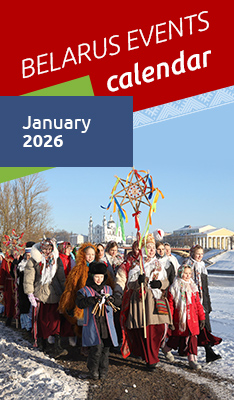




 print version
print version make home page
make home page add to bookmarks
add to bookmarks